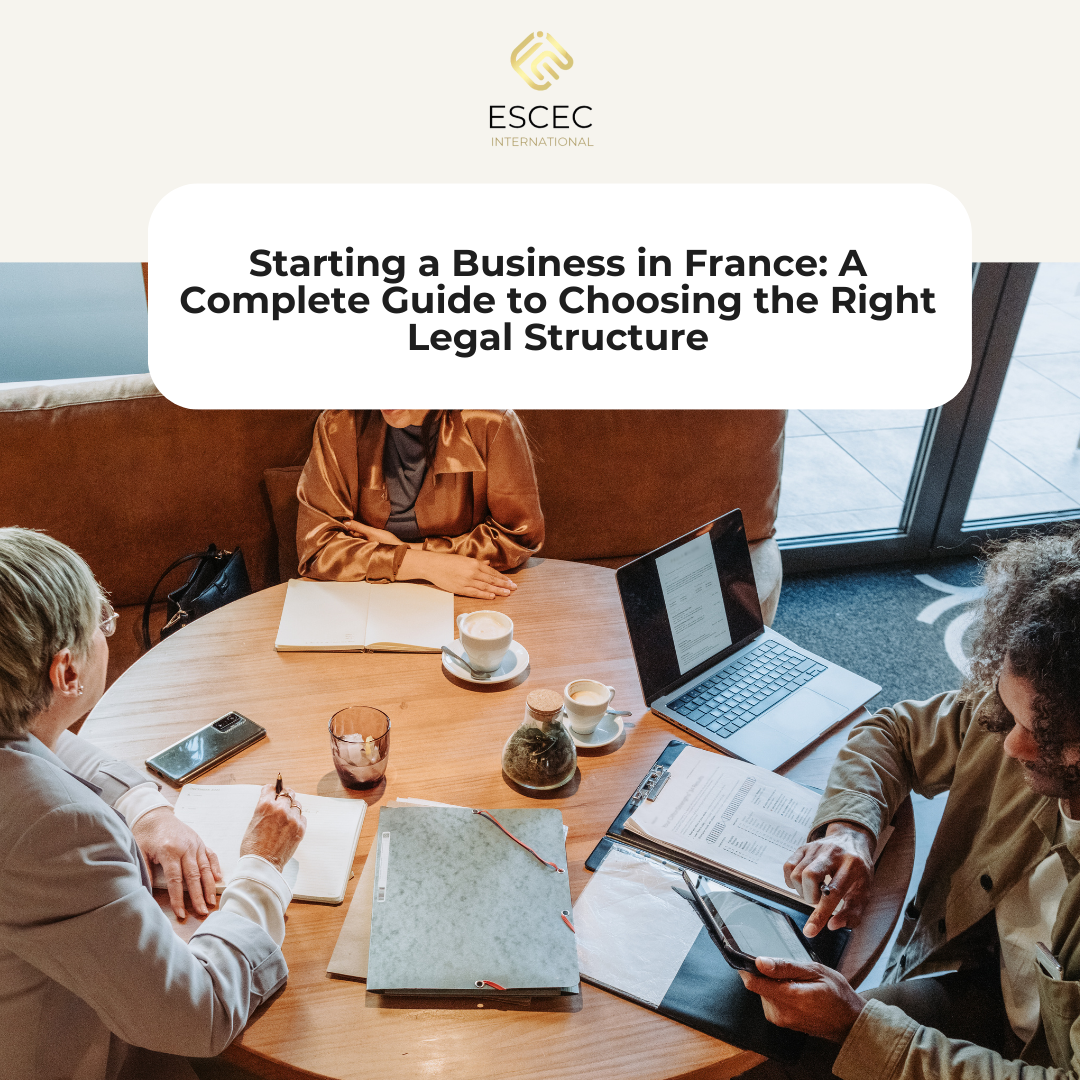Starting a Business in France: A Complete Guide to Choosing the Right Legal Structure
Starting a business in France requires understanding the different legal structures, their tax and social implications, and the necessary administrative steps. At ESCEC International, we guide entrepreneurs, startups, and international investors through every stage of creating and growing their company.
1. Understanding Legal Structures in France
Choosing the right legal structure impacts taxation, liability, accounting requirements, and operational flexibility. The main types of business entities in France include:
SARL (Société à Responsabilité Limitée)
-
Limited liability: Owners’ responsibility is limited to their capital contributions.
-
Governance: Managed by one or more managers (gérants).
-
Taxation: Profits are generally subject to corporate tax, with options for personal income tax under certain conditions.
-
Ideal for: Small and medium-sized businesses seeking a stable legal framework.
SAS (Société par Actions Simplifiée)
-
Flexibility: Offers flexible governance rules and contractual freedom.
-
Limited liability: Shareholders’ liability is limited to their contributions.
-
Taxation: Standard corporate tax applies, with some options for income tax.
-
Ideal for: Startups, investors, and companies planning rapid growth or external funding.
Sole Proprietorship / Micro-Enterprise
-
Simplicity: Easiest form to set up with minimal administrative obligations.
-
Liability: The entrepreneur is personally liable for business debts (unless opting for EIRL to separate assets).
-
Taxation: Income is taxed under personal income tax with simplified accounting.
-
Ideal for: Freelancers, independent consultants, or small businesses starting with low risk.
Other Options
-
EURL (Single-Member SARL): SARL with one shareholder, similar rules to SARL.
-
EIRL (Entrepreneur individuel à responsabilité limitée): Allows sole proprietors to separate personal assets from business liabilities.
2. Key Considerations When Choosing a Legal Structure
When deciding which structure fits your business, consider:
-
Liability protection: How much personal risk are you willing to take?
-
Tax regime: Corporate vs. personal income tax, VAT obligations, and social contributions.
-
Investment and funding needs: Will you seek investors or external funding?
-
Administrative complexity: Reporting, accounting, and regulatory compliance requirements.
3. Steps to Start a Business in France
-
Choose your legal structure: Assess your business type, size, and growth plans.
-
Draft statutes / articles of association: Formalize the company rules and governance.
-
Deposit capital: Open a business bank account and deposit required share capital.
-
Register with the relevant authorities: Depending on your activity, register with the Centre de Formalités des Entreprises (CFE) or the Chamber of Commerce.
-
Obtain necessary permits or licenses: For regulated activities (e.g., financial services, food, healthcare).
-
Set up accounting and tax reporting: Ensure compliance with VAT, corporate tax, and social security contributions.
4. How ESCEC International Supports Entrepreneurs
At ESCEC International, we simplify the business creation process for our clients:
-
Personalized advice: Help you choose the most suitable legal structure for your business model.
-
Administrative support: Assist with company registration, capital deposits, and legal documentation.
-
Accounting & tax setup: Establish compliant accounting systems and VAT reporting frameworks.
-
Ongoing guidance: Support your business growth and adapt to regulatory changes.
Conclusion
Starting a business in France can seem complex, but with the right guidance, it becomes a structured and manageable process. ESCEC International ensures entrepreneurs, freelancers, and international investors navigate legal, financial, and regulatory requirements efficiently — giving you peace of mind and a solid foundation for growth.

